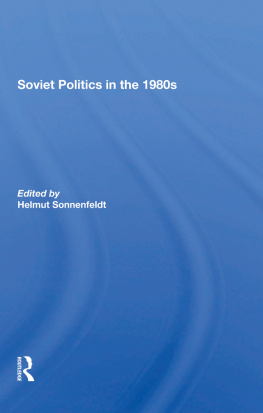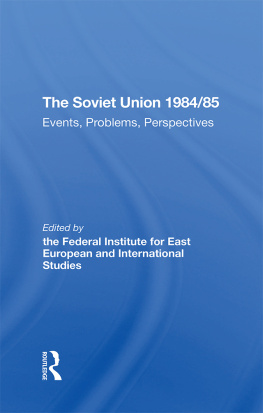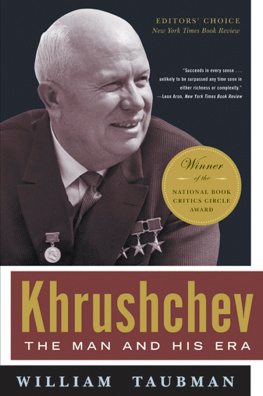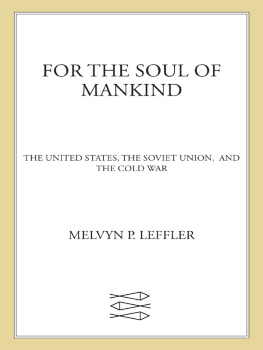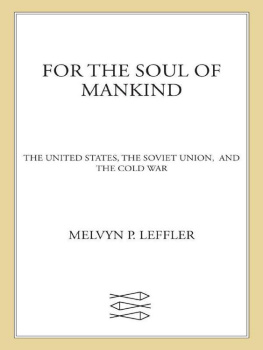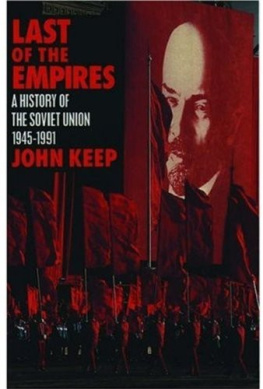Routledge Revivals
Khrushchev and Brezhnev as Leaders
First published in 1982, this book explores how Khrushchev and Brezhnev manipulated their policies and personal images as they attempted to consolidate their authority as leader. Central issues of Soviet domestic politics are examined: investment priorities, incentive policy, administrative reform, and political participation. The author rejects the conventional images of Khrushchev as an embattled consumer advocate and decentraliser, and of Brezhnevs leadership as dull and conservative. He looks at how they dealt with the task of devising programs that combined the post-Stalin elites goals of consumer satisfaction and expanded political participation with traditional Soviet values.
Khrushchev and Brezhnev as Leaders
Building Authority in Soviet Politics
George W. Breslauer
First published in 1982
by George Allen & Unwin Ltd.
This edition first published in 2016 by Routledge
2 Park Square, Milton Park, Abingdon, Oxon, OX14 4RN
and by Routledge
711 Third Avenue, New York, NY 10017
Routledge is an imprint of the Taylor & Francis Group, an informa business
1982 George W. Breslauer
All rights reserved. No part of this book may be reprinted or reproduced or utilised in any form or by any electronic, mechanical, or other means, now known or hereafter invented, including photocopying and recording, or in any information storage or retrieval system, without permission in writing from the publishers.
Publishers Note
The publisher has gone to great lengths to ensure the quality of this reprint but points out that some imperfections in the original copies may be apparent.
Disclaimer
The publisher has made every effort to trace copyright holders and welcomes correspondence from those they have been unable to contact.
A Library of Congress record exists under LC control number: 828835
ISBN 13: 978-1-138-68670-0 (hbk)
ISBN 13: 978-1-315-54257-7 (ebk)
ISBN 13: 978-1-138-68671-7 (pbk)
Khrushchev and Brezhnev as Leaders: Building Authority in Soviet Politics
GEORGE W. BRESLAUER
Department of Political Science, University of California, Berkeley
London
GEORGE ALLEN & UNWIN
Boston Sydney
George W. Breslauer, 1982
This book is copyright under the Berne Convention. No reproduction without permission. All rights reserved.
George Allen & Unwin (Publishers) Ltd,
40 Museum Street, London WC1A 1LU, UK
George Allen & Unwin (Publishers) Ltd,
Park Lane, Hemel Hempstead, Herts HP2 4TE, UK
Allen & Unwin, Inc.,
9 Winchester Terrace, Winchester, Mass. 01890, USA
George Allen & Unwin Australia Pty Ltd,
8 Napier Street, North Sydney, NSW 2060, Australia
First published in 1982
British Library Cataloguing in Publication Data
Breslauer, George W.
Khrushchev and Brezhnev as leaders.
1. Soviet Union Politics and government 1953
I. Title
320.947 JN6581
ISBN 004329040X
ISBN 0043290418 Pbk
Library of Congress Cataloging in Publication Data
Breslauer, George W.
Khrushchev and Brezhnev as leaders.
Bibliography: p.
Includes index.
1. Soviet Union Politics and government 1953
2. Elite (Social sciences) Soviet Union. 3. Khrushchev, Nikita Sergeevich, 18941971. 4. Brezhnev, Leonid
Ilich, 1906 . I. Title.
JN6581.B73 1982 947.085 828835
ISBN 004329040X AACR2
ISBN 0043290418 (pbk.)
Set in 10 on 11 point Plantin by Grove Graphics, Tring
and printed in Great Britain
by Biddles Ltd, Guildford, Surrey
Contents
How Strong the Leader?:
Khrushchevs Power over Policy
Two menNikita Khrushchev and Leonid Brezhnevhave served as First Secretary (or General Secretary) of the Communist Party of the Soviet Union for almost the entire period since Stalins death in March 1953. Each in his own time, and in his own way, consolidated his power and advanced comprehensive policy programs. Each saw his program frustrated by a variety of factors beyond his control. Each responded to that frustration by searching for new ways to make his policies more effective and his political position more secure. Thus, each grappled continuously with the challenge of building up his authority as leader, even though he occupied by far the most powerful position in the Soviet political system.
This book is a study of the means by which Khrushchev and Brezhnev attempted to build up their authority as leaders. It explores similarities and differences in the ways these two leaders fashioned their policy appeals and personal images so as (hopefully) to increase elite confidence in, or dependence upon, their stewardship. More specifically, it explores their policy programs and political strategies in dealing with some of the central issues of Soviet domestic politics: investment priorities, incentive policy, administrative reform, and political participation. The purposes of the investigation are several-fold: (1) to develop a persuasive portrait of the positions these men adopted on the issues in question; (2) to examine the evolution of their positions and approaches over time; (3) to explore the interaction between their evolving political programs and their strategies for augmenting their authority within the political elite; (4) to compare and contrast the evolution of Khrushchevs approaches with the evolution of Brezhnevs, in order to separate the common from the distinctive features of their behaviour; and (5) to draw from these comparisons some lessons about factors that shape the behavior of the Party leader.
There was a time when studies of elite politics and policy preferences were in abundance in the field of Soviet studies. Throughout the 1960s and into the 1970s, important (and often provocative) studies of the Khrushchev administration were published, examining the ways in which Khrushchev dealt with many of the issues noted above. Some of those books included the first years of the Brezhnev administration as well, in order to highlight the contrast in policy preferences and political style with Brezhnevs predecessor. A few books focused comparatively on the last years of the Khrushchev administration and the first years of Brezhnevs. But no research monograph on Soviet elite politics has taken a long view of both administrations.1 Hence, we have no complete base of evidence for drawing lessons about die behavior of the Party leader in the post-Stalin era.
One obvious explanation for this gap is that Brezhnev did not match Khrushchev in political longevity as Party leader until the mid-1970s. This matter of simple timing may have influenced the choice of research topics, but it is a partial explanation at best, for listings of dissertation topics in Soviet studies during the late 1970s do not indicate a change.2 I believe there have been a number of more fundamental factors at work. First, the abuses of kremlinology by some of its practitioners have discredited the methodology per se in the eyes of many scholars. Second, the inability to study policymaking processes on the grand issues of Soviet politics, without employing some variant of the kremlinological method, has led scholars to study decision-making on less politicized issues (such as housing, urban planning, ecology, crime control) that do not occupy much of the attention of the Politburo.3 Third, a lack of new ideas about the nature of Soviet elite values, and the lack of an accepted methodology for tapping them, has led scholars simply to stop debating key historical issues about the nature of Khrushchevs policies and the extent of his power, or about the relative balance of conflict and consensus in the Soviet Politburo under both Khrushchev and Brezhnev.


